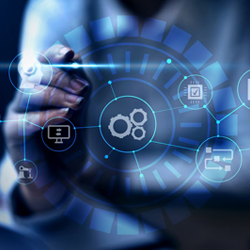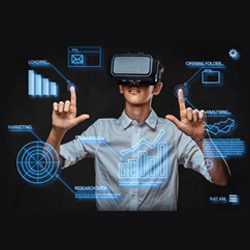- Home
- Offshore
- Services
- Capabilities
- Industries
- Big Data Analytics
- About Us
- Digital Marketing
- Resource
- Contact Us

In this growing era of technology, there is a high demand for Enterprise Resource Planning (ERP) systems due to the increasing and competitive demand in the market.
These comprehensive software solutions have evolved over the years, offering businesses an advanced technological solution that streamline the business process and operations that enhances the decision making and boosts business productivity and growth.
In this blog post, we shall understand the technological advancements of the ERP systems and ways in which they empower the businesses to survive in the competitive market.
ERP systems have come a long way since they were discovered in and around the 1960s. The motive behind the design is to automate the manufacturing processes that expands to the different functionalities ranging from finance, human resources, business operations, supply chain management, customer relationship management and much more. This evolution has been fueled by the advancements in the technology, artificial intelligence, cloud computing, machine learning (ML) and Internet of Things (IoT).
One of the major elements in the field of technology is the ERP systems which have the ability to seamlessly integrate with other systems and applications within an organisation. This particular integration enables the real-time data exchange and interoperability between different departments also providing a holistic view of the business operations.
When it comes to an integration of CRM software to manage the customer interactions or syncing with the inventory management systems to optimise supply chain management and processes, ERP systems facilitate the efficient communication and collaboration across the enterprise.


One of the major elements in the field of technology is the ERP systems which have the ability to seamlessly integrate with other systems and applications within an organisation. This particular integration enables the real-time data exchange and interoperability between different departments also providing a holistic view of the business operations.
Cloud ERP eliminates the need for the expensive investments in infrastructure and maintenance which makes it the most attractive option for the business of all sizes.
Another most important and top notch technological edge of the modern ERP system is advanced
Business Intelligence and analytics. By leveraging ML and AI algorithms, the ERP systems can analyse the vast amounts of data in real-time, unveiling the trends and valuable insights that drive informed decision making. The data analytics empowers businesses, predicts customer demand to optimise the inventory levels.
An integrated reporting and dashboard functionalities which enables the stakeholders to visualise the key performance indicators (KPIs) and track progress towards the organisational goals.


An automation in the modern ERP system shall enable the business to streamline any repetitive tasks, improve efficiency and minimise the errors and risks associated with business processes. ERP systems can automate the mundane tasks such as the payroll processing, invoicing and inventory management.
The robotic process automation enhances the efficiency by automating tasks and reducing any manual processes. Through automation of routine tasks and processes, ERP systems shall enable the employees to focus on activities that drive growth and innovation.
In today’s era, there is a sudden increase in the number of cyber threats, security breaches and compliance issues which are the most important for business growth. These modern ERP systems incorporate the robust security features that shall adhere to the standard industry standards and regulations which ensures the integrity and security of the information and data.
ERP systems provide comprehensive security solutions to protect against the breach of data and information. Businesses can mitigate financial and legal risks when built-in compliance frameworks help them adhere to regulatory requirements.


The future of ERP systems promises to provide greater technological innovation and advancement. The emerging technologies such as the augmented reality (AR) and edge computing which are possessed to to revolutionise the ERP landscape. This comprehensive ERP system offers efficiency, transparency and competitiveness.
holds the highest potential to enhance the supply chain traceability and streamline the financial transactions while the AR enabled ERP systems can transform the repair operations and maintenance by providing real-time visual guidance.
ERP systems have emerged as the inevitable tool for businesses seeking a technological edge in today’s dynamic business environment. With an integration ability, a cloud based infrastructure, automation features, robust security features, advanced analytics and modern ERP systems which empowers the organisations to streamline operations, drive innovation and achieve sustainable growth.
As technology is advancing and evolving, the ERP systems shall remain at the forefront of the sudden transformation which shall enable the businesses to stay competitive, agile and resilient in an ever changing landscape.